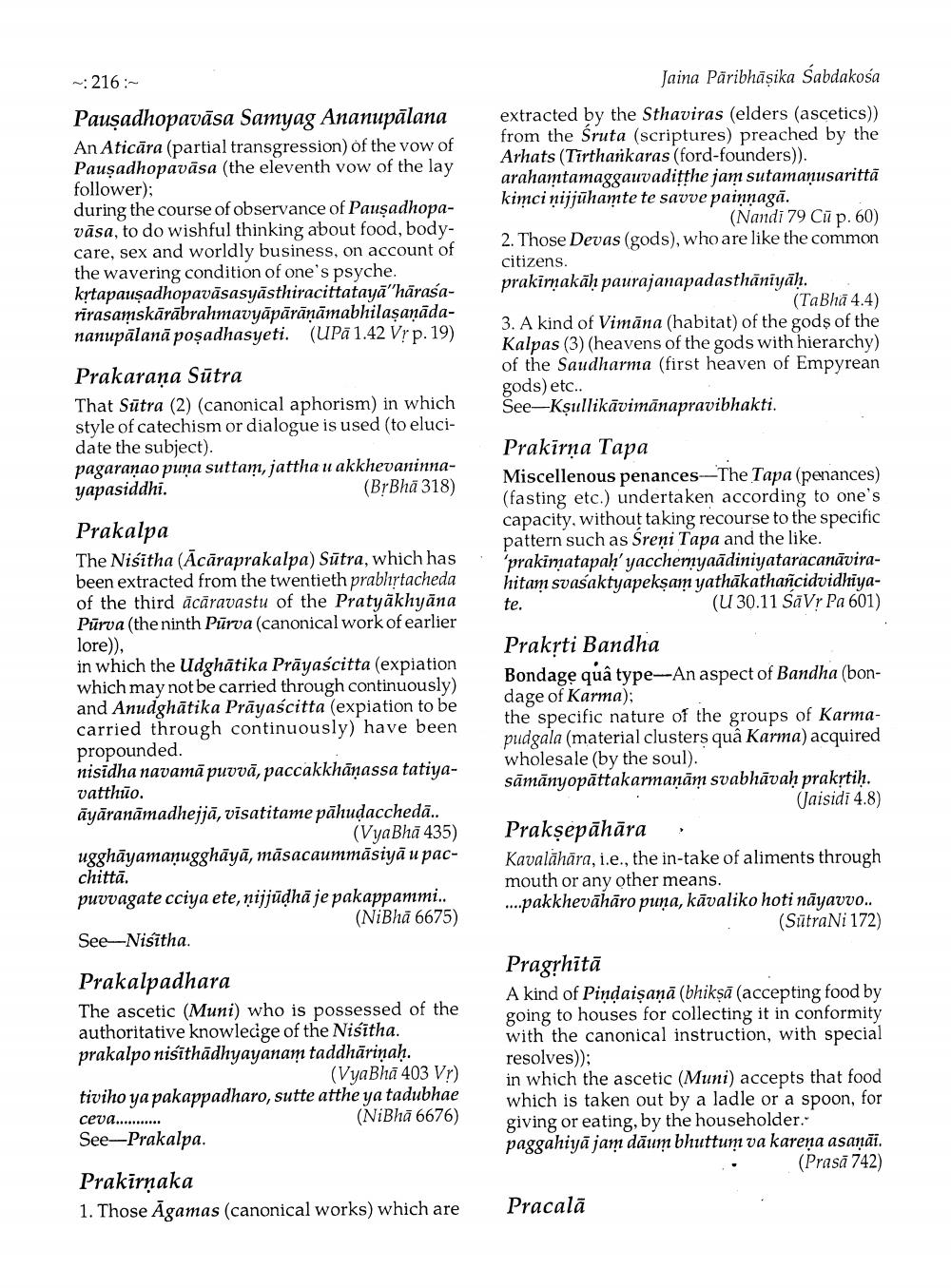________________
- 216:Pauşadhopavāsa Samyag Ananupālana An Aticāra (partial transgression of the vow of Pausadhopavāsa (the eleventh vow of the lay follower); during the course of observance of Pauşadhopavāsa, to do wishful thinking about food, bodycare, sex and worldly business, on account of the wavering condition of one's psyche. kytapausadhopavāsasyāsthiracittatayā hārasarirasamskārābrahmavyāpārāņāmabhilaşanādananupälanā poşadhasyeti. (UPā 1.42 Vr p. 19)
Jaina Pāribhāṣika Sabdakosa extracted by the Sthaviras (elders (ascetics) from the Sruta (scriptures) preached by the Arhats (Tirtharkaras (ford-founders)). arahamtamaggauvaditthe jam sutamanusaritta kimci nijjūhamte te savve painnaga.
(Nandi 79 Cū p. 60) 2. Those Devas (gods), who are like the common citizens. prakirņakāḥ paurajanapadasthāniyāḥ.
(Tabhā 4.4) 3. A kind of Vimāna (habitat) of the gods of the Kalpas (3) (heavens of the gods with hierarchy) of the Saudharma (first heaven of Empyrean gods) etc.. See-Kșullikāvimānapravibhakti.
Prakarana Sūtra That Sūtra (2) (canonical aphorism) in which style of catechism or dialogue is used to elucidate the subject). pagaranao puna suttam, jattha u akkhevaninnayapasiddhi.
(BrBhā 318)
Prakīrņa Tapa Miscellenous penances--The Tapa (penances) (fasting etc.) undertaken according to one's capacity, without taking recourse to the specific pattern such as Sreņi Tapa and the like. 'prakimatapah' yacchernyaādiniyataracanăvirahitam svasaktyapekşam yathākathañcidvidhiya
(U 30.11 SÄVr Pa 601)
te.
Prakalpa The Nisītha (Ācāraprakalpa) Sūtra, which has been extracted from the twentieth prabhurtacheda of the third ācāravastu of the Pratyākhyāna Pūrva (the ninth Pūrva (canonical work of earlier lore)), in which the Udghātika Prāyaścitta (expiation which may not be carried through continuously) and Anudghātika Prāyaścitta (expiation to be carried through continuously) have been propounded. nisidha navamā puvvā, paccakkhāṇassa tatiyavatthūo. āyāranāmadhejjā, visatitame pāhudacchedā..
(VyaBhā 435) ugghāyamanugghāyā, māsacaummāsiyā u pacchittā. puvvagate cciya ete, nijjūdhä je pakappammi..
(Nibhā 6675) See Nisītha.
Prakrti Bandha Bondage quâ type--An aspect of Bandha (bondage of Karma); the specific nature of the groups of Karmapudgala (material clusters quâ Karma) acquired wholesale (by the soul). sāmānyopāttakarmaņām svabhāvah prakytih.
(Jaisidi 4.8) Praksepāhāra , Kavalähāra, i.e., the in-take of aliments through mouth or any other means. ....pakkhevāhāro puņa, kāvaliko hoti nāyavvo..
(SütraNi 172)
Prakalpadhara The ascetic (Muni) who is possessed of the authoritative knowledge of the Nisitha. prakalpo nisīthādhyayanam taddhāriņaḥ.
(VyaBhā 403 Vr) tiviho ya pakappadharo, sutte atthe ya tadubhae ceva.........
(NiBhā 6676) See-Prakalpa.
Pragrhītā A kind of Pindaişaņā (bhikṣā (accepting food by going to houses for collecting it in conformity with the canonical instruction, with special resolves)); in which the ascetic (Muni) accepts that food which is taken out by a ladle or a spoon, for giving or eating, by the householder. paggahiyā jam dāum bhuttum va karena asaņāi.
(Prasā 742)
Prakīrņaka 1. Those Āgamas (canonical works) which are
Pracalā




